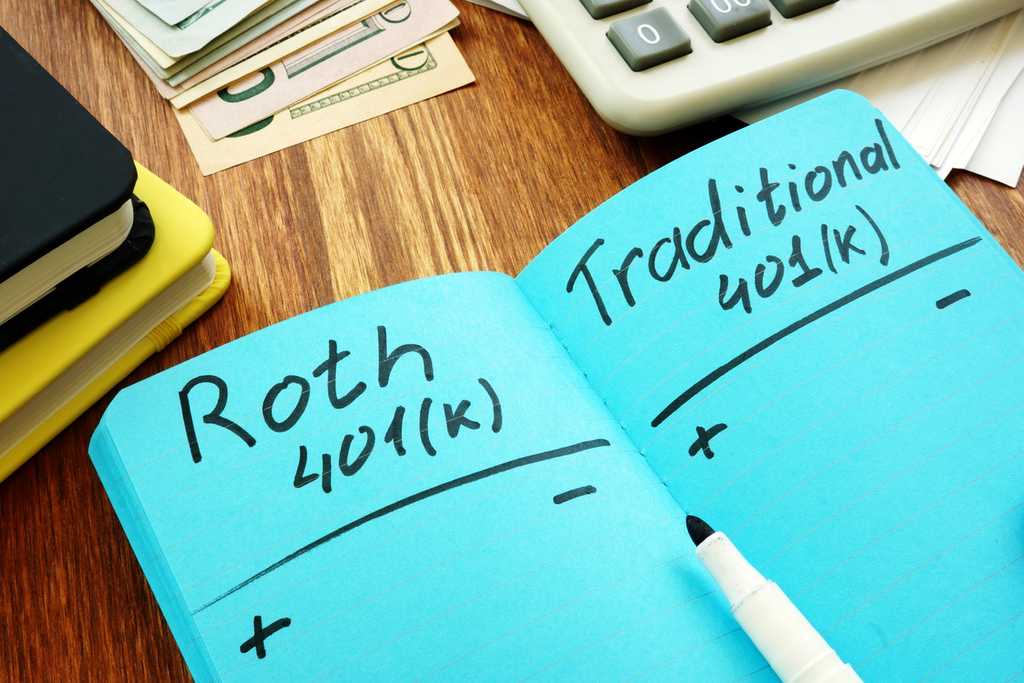Most people have heard the saying that nothing in life is certain except for death and taxes. The real question is, would you prefer to pay taxes now or later on?
That's the conundrum faced by workers who are offered more than one type of retirement account by their employer, and specifically a traditional 401(k) and a Roth 401(k). Where one type of account lets you defer taxes until you reach retirement age, the other has you face the pain head on then enjoy tax-free retirement funds once you begin taking distributions after age 59 ½.
If you're being offered both a 401(k) and a Roth 401(k), you may be wondering which type of account might leave you better off now and later in life. This guide will explain how the 401(k) and Roth 401(k) are the same, how they are different and how to decide between the two.
401(k) vs. Roth 401(k): Similarities
Both the traditional 401(k) and the Roth 401(k) are retirement plans that could be offered by your employer. This makes them considerably convenient to use since your contributions can come directly from your paycheck without any work required on your part.
Since the 401(k) and the Roth 401(k) are both employer-based retirement plans, it's also possible you could get a matching contribution with either option. This takes place when your employer decides to "match" the contributions you make up to a certain percentage, or even a flat amount each year.
You'll also find the same annual contribution limits with either type of account. According to the Internal Revenue Service (IRS), the maximum amount you can contribute to a 401(k) or Roth 401(k) is $19,500 in 2021, which is the same as 2020. However, you can also contribute an additional $6,500 to either account if you are ages 50 and older using what is known as a "catch-up contribution."
In summary, both the 401(k) and the Roth 401(k) let you save for retirement with ease, and you might even get some free money from your employer if you use them. But there are huge differences between these two types of accounts, which we'll explore in more detail in the next section.
401(k) vs. Roth 401(k): Where Do They Differ?
The main difference between the 401(k) and the Roth 401(k) is when you pay taxes — now or later on. Where the traditional 401(k) lets you defer taxes until you begin taking distributions in retirement, the Roth 401(k) lets you pay taxes now in the same way you do if you have a Roth IRA.
This means you have a big choice to make if you're trying to decide between a traditional 401(k) and the Roth 401(k) for your retirement. You can avoid taxes now with a traditional 401(k), but you'll be taxed at current rates once you begin taking distributions after the age of 59 ½.
With the Roth 401(k), on the other hand, you pay taxes now to get them out of the way. From there, you can begin taking tax-free distributions once you're 59 ½ or older as long as you have had your account for five years or longer.
Traditional 401(k) vs. Roth 401(k) Comparison Chart
We created the chart below to sum things up and help you compare both of these retirement plans. If you're curious which type of account you should use and why, remember the details listed below.
| Traditional 401(k) | Roth 401(k) | |
|---|---|---|
Who offers it? | Your employer | Your employer |
Contribution limits in 2021 | $19,500 | $19,500 |
Catch-up contribution | Up to $6,500 if you're ages 50 or older | Up to $6,500 if you're ages 50 or older |
Employer match | If your employer offers it | If your employer offers it |
When do you pay taxes | Once you begin taking distributions in retirement | Now |
When is the Traditional 401(k) Better?
There are plenty of details to consider before you decide between a traditional 401(k) and a Roth 401(k), and there are arguments in favor of using either option over the other. However, the traditional 401(k) is usually considered the superior option for people who believe they'll be taxed at a lower rate in retirement than they're taxed at now.
While nobody has a crystal ball to know for sure, it's not that unreasonable to believe someone in retirement age might be taxed at a much lower rate. This is especially true for workers in their peak earning years who plan to live on a lower amount of money once they leave the workforce. Choosing the traditional 401(k) means you get to defer taxes, but it also means you get more actual cash into your retirement account so it can grow over time. If someone is indeed taxed at a lower rate once they begin taking distributions in retirement, the traditional 401(k) should leave them ahead.
When is the Roth 401(k) Better?
Still, some experts argue that the Roth 401(k) is far superior, and this is due to the fact that distributions in retirement will be entirely tax-free. You'll pay the tax man now, but your money gets to grow and compound tax-free from there, and you won't have to care what tax bracket you fall into once you're ready to walk away from your career.
Furthermore, a major argument in favor of Roth accounts is the potential for higher tax rates in the future, which is pretty easy to expect considering the nation's growing debt. Again, nobody has the ability to know for sure what tax rates might look like a decade or several decades from now. But based on how the U.S. is currently spending money, high taxes in the future seem likely, if not guaranteed.
Could You Contribute to Both?
When it comes to retirement and taxes, there are many competing schools of thought. However, you should know that you don't necessarily have to choose between these two accounts, and that you could be better off if you use both during the course of your career.
Of course, this all depends on whether your employer offers a Roth 401(k) option in addition to a traditional plan. According to a study from the Plan Sponsor Council of America (PSCA), nearly 70 percent of employers offer a Roth 401(k) option as of last count.
That's great news if your job offers both options so you can choose, but how do you decide which plan to use and when?
In some cases, it could make sense to use a Roth 401(k) early in your career when you're earning less and paying a lower tax rate, then switch to a traditional 401(k) later on when you're earning more. This strategy could leave you paying a lower tax bill during your peak earning years, but it will also help you diversify your retirement funds so you can have more choices once you're ready to enjoy your retirement.
The Bottom Line
Saving for retirement is a marathon and not a sprint. Still, the decisions you make along the way could leave you with significantly more (or a lot less) money to cover living expenses once you're in your golden years.
The choice between a traditional 401(k) and a Roth 401(k) is important, but you also need to make sure you're not so paralyzed by the choice that you fail to take action at all. Whether you decide to pay taxes now or later on, you need to save like your retirement depends on it.
As most people who are currently in retirement will tell you, steps you take or don't take now can make a huge difference.

